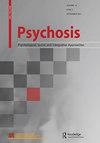首次精神病发作的多家庭治疗:一项初步研究
IF 1
4区 医学
Q4 PSYCHIATRY
Psychosis-Psychological Social and Integrative Approaches
Pub Date : 2022-03-02
DOI:10.1080/17522439.2022.2037693
引用次数: 0
摘要
背景:多家族治疗组(MFG)已被证明可以降低首次精神病发作(FEPs)精神病症状复发的风险,但在治疗方案中并不常见。本文描述了家庭间治疗模式在西班牙精神卫生中心的FEP早期干预项目中的实施情况。目的是检查(a)复发(以再次住院衡量),(b)再次住院持续时间,(c)与前一年相比,参加MFG期间自愿与非自愿再次住院的情况。方法21例患者参加了为期12个月的MFG,其中11例为精神病患者,10例为家庭成员。结果患者及其家属参与治疗的次数约为50%,治疗过程中表现出满意的体验。在参与MFG的患者中,观察到较低的复发率:精神病住院人数较低(7对3),持续时间较短[预处理23.57 (SD 18.5)天对治疗期间19.33 (SD 10.2)天],尽管可能由于样本量小而无统计学意义(p > 0.05)。多家庭治疗已被患者及其家属所接受,参与程度高。我们的印象是,同时参与不同的治疗活动(个人、团体和多家庭)可以改善治疗过程的体验。本文章由计算机程序翻译,如有差异,请以英文原文为准。
Multifamily therapy in first psychotic episodes: a pilot study
ABSTRACT Background Multifamily groups (MFG) have shown to reduce the risk of relapse of psychotic symptoms in first episodes of psychosis (FEPs) but are not frequently implemented in treatment programs. This paper describes the implementation of the interfamily therapy-model in a FEP early intervention program within a Mental Health Centre in Spain . The aims were to examine (a) relapses (measured as re-hospitalization), (b) duration of re-hospitalizations and (c) voluntary versus involuntary re-hospitalizations during participation in MFG compared with the previous year. Methods Twenty-one subjects participated in a MFG over 12 months, 11 participants with a diagnosis of psychosis and 10 family members. Results Patients and their relatives participated in around 50% of treatment sessions and manifested satisfactory experience during treatment. Among the patients who participated in MFG, a lower relapse rate was observed: a lower number of psychiatric admissions (7 versus 3) and of shorter duration [23.57 (SD 18.5) days pretreatment versus 19.33 (SD 10.2) days during treatment] although it was not statistically significant (p > 0.05), probably due to small sample size. Discussion Multifamily therapy has been well accepted by both patients and their families, with a high degree of participation. Our impression is that the simultaneous participation in different therapeutic activities (individual, group and multifamily) improves the experience of the therapeutic process.
求助全文
通过发布文献求助,成功后即可免费获取论文全文。
去求助
来源期刊
CiteScore
2.20
自引率
8.30%
发文量
36

 求助内容:
求助内容: 应助结果提醒方式:
应助结果提醒方式:


